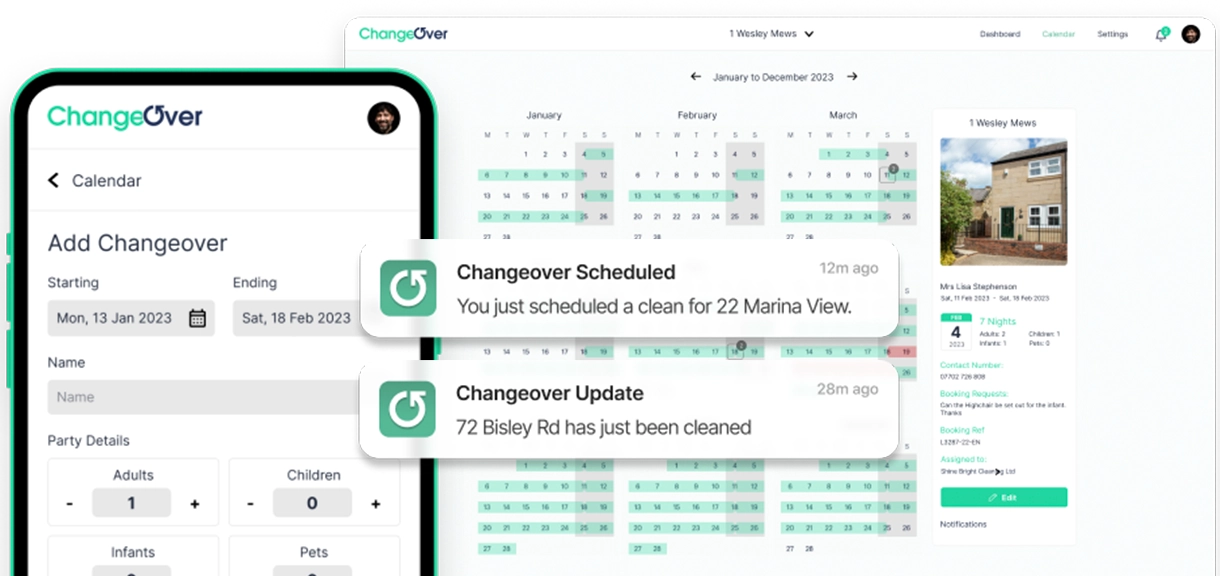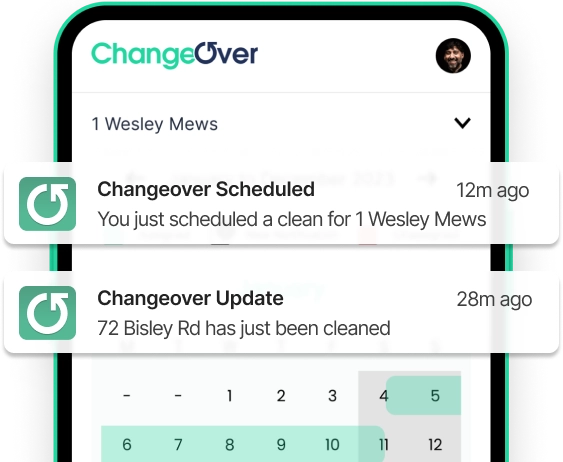Automate STR & Airbnb Cleaning
with our Easy-to-Use
Cleaning Service App
No more messy communications with your cleaner & worrying about missing a changeover!
Find out more
For example, consider the case of Sarah, an aspiring property entrepreneur. Sarah identified a high-demand area for short-term rentals in a bustling city known for its vibrant cultural scene and tourist attractions. After conducting thorough market research to understand the demand for short-term accommodations in the area, Sarah negotiated favourable rental terms with property owners, set up the properties for short-term rentals, and listed them on platforms like Airbnb to attract travellers and generate income. Through this endeavour, Sarah was able to establish a profitable rental arbitrage business, showcasing the potential of this strategy for individuals looking to enter the vacation rental market without the financial commitment of property ownership.
In addition to the financial aspect, Airbnb arbitrage offers freedom in property management, providing flexibility in its operation. This independence allows arbitrageurs to make decisions regarding property maintenance, guest interactions, and the overall experience they wish to offer, without having to navigate the constraints imposed by property ownership. This level of control can be empowering and attractive to those interested in managing their own business and property without the traditional responsibilities tied to ownership.
Another compelling aspect of Airbnb arbitrage is the accessibility it offers to individuals who do not own property. This means that individuals can participate in the short-term rental market without the financial or logistical commitments associated with property ownership. By subletting properties that they do not own, individuals can still benefit from the revenue streams created by short-term rentals, providing an accessible entry point into the real estate and hospitality industries.
One of the primary advantages of Airbnb arbitrage is the potential for high income. Rental arbitrage can be a lucrative endeavor, with the potential to generate profit over time. For instance, individuals who engage in Airbnb arbitrage may see returns that are two or three times the property expenses, making it a financially rewarding option for many. This financial potential has attracted numerous individuals, including the older generation, who have successfully leveraged Airbnb arbitrage to achieve substantial income, showcasing its viability as a source of significant earnings.
Moreover, consider the success story of John, a retiree who ventured into Airbnb rental arbitrage as a means of supplementing his retirement income. By strategically selecting properties in a popular tourist destination and implementing effective marketing strategies, John was able to generate a steady stream of income that significantly enhanced his financial security during retirement. This example underscores the potential for rental arbitrage to provide substantial income, making it an attractive option for individuals seeking additional financial stability in their retirement years.
In addition to the financial rewards, rental arbitrage offers freedom in property management, providing individuals with the ability to manage their properties according to their preferences and business strategies. This level of control allows arbitrageurs to implement creative marketing approaches, tailor guest experiences, and make operational decisions without the constraints associated with property ownership. Such freedom can be particularly appealing to individuals looking to establish and manage their own business within the dynamic short-term rental market.
Furthermore, not needing to own property is a significant advantage of Airbnb arbitrage. This means that individuals can participate in the short-term rental market without the financial or logistical commitments associated with property ownership. By subletting properties that they do not own, individuals can still benefit from the revenue streams created by short-term rentals.

Engaging in Airbnb arbitrage presents various risks and challenges that individuals need to be aware of. One significant risk is the exposure to changing market conditions, which can affect the demand for short-term rentals and the potential income from the properties. For instance, shifts in travel trends, economic fluctuations, or the emergence of new accommodation options can impact the profitability of Airbnb arbitrage ventures. It’s crucial for arbitrage operators to conduct ongoing market research to stay informed about these changes and adapt their strategies accordingly.
Moreover, the potential for property damage and the responsibility for addressing such issues is a notable challenge in Airbnb arbitrage. Whether it’s due to guest negligence, accidents, or natural disasters, property damage can lead to unexpected repair costs and downtime for the rental property. This risk underscores the importance of having comprehensive insurance coverage and clear guidelines for guests to minimize the likelihood of damage and ensure proper protection in case of unforeseen events.
Furthermore, navigating legal restrictions and the possibility of eviction poses a substantial challenge for Airbnb arbitrage practitioners. Local regulations and landlord agreements can impact the operation of short-term rentals, and non-compliance may result in legal consequences or lease termination. To mitigate this risk, individuals involved in rental arbitrage must thoroughly understand the legal framework governing their property’s location and establish transparent communication with landlords to address any concerns or potential conflicts.
In addition to these challenges, it’s essential for individuals to be mindful of the financial implications and initial costs associated with Airbnb arbitrage. This includes expenses such as rent, property maintenance, furnishing, and marketing. By carefully planning and budgeting for these initial costs, individuals can mitigate the financial risks and position themselves for long-term success in the rental arbitrage business.
When it comes to finding suitable properties for Airbnb arbitrage, it’s essential to consider the location and profitability of the cities where the properties are situated. Conducting thorough market research is crucial in identifying areas with high demand for short-term rentals and potential for profitability. For instance, a property located in a tourist hotspot or near major attractions may attract more guests and yield higher income compared to properties in less popular areas.
Moreover, leveraging property search websites such as Rightmove and Zoopla can significantly streamline the process of finding properties that align with the specific requirements for Airbnb arbitrage. These platforms offer a wide range of properties, allowing potential arbitrage investors to filter their search based on location, property type, size, and other relevant criteria. For example, a property investor targeting a bustling urban area may prioritize studio apartments or one-bedroom units, while someone focusing on family-oriented vacation rentals might seek larger properties with multiple bedrooms.
Additionally, understanding the local regulations and laws pertaining to short-term rentals in potential investment areas is crucial for making informed decisions about property selection. It’s important to be aware of any restrictions or licensing requirements that may affect the ability to operate an Airbnb business legally in a specific location. By considering these factors during the property search and selection process, individuals can position themselves for success in the Airbnb arbitrage business.
Furthermore, analyzing market trends and demand indicators can provide valuable insights into the potential profitability of a property for Airbnb arbitrage. Factors such as seasonal variations in travel, local events, and the overall tourism landscape can influence the performance of short-term rentals, guiding individuals in making informed decisions about property selection and investment. By incorporating these considerations into the property search and selection process, individuals can enhance their ability to identify properties with high potential for success in the rental arbitrage business.
When it comes to pricing and marketing strategies for successful Airbnb arbitrage, there are several key factors to consider. Firstly, calculating the average rate for the specific area is crucial. This involves conducting thorough market research to understand the typical rates for similar properties in the vicinity. For example, if you are targeting a property in a popular tourist destination, the rates might be higher during peak seasons, allowing for more profitable pricing strategies. By considering the demand and average rates for the area, you can set competitive yet profitable prices for your Airbnb listings.
In addition to pricing, effective marketing strategies play an integral role in the success of Airbnb arbitrage. Listing the property on multiple vacation rental platforms can significantly enhance its visibility and attract a wider range of potential guests. Utilizing platforms like Airbnb, VRBO, and Booking.com can diversify your property’s exposure and increase the chances of consistent bookings. Moreover, optimizing the property listings with high-quality images, detailed descriptions, and positive guest reviews is essential for attracting potential guests. By highlighting the unique features and amenities of the property, you can effectively market it to a broader audience, ultimately leading to increased bookings and higher earnings.
Furthermore, consider the use of data-driven pricing strategies to maximize the profitability of Airbnb arbitrage properties. By analyzing historical booking patterns, local events, and demand fluctuations, individuals can adjust pricing dynamically to capitalize on peak demand periods and optimize revenue. For instance, offering promotional rates during off-peak seasons or strategically adjusting pricing based on upcoming events can attract more guests and drive higher occupancy rates, contributing to the overall success of the rental arbitrage business. By integrating data-driven pricing strategies into the marketing approach, individuals can enhance the performance of their Airbnb listings and achieve greater financial returns.

When delving into Airbnb arbitrage, it’s essential to prioritize understanding the local regulations and laws that govern short-term rentals. These regulations can significantly vary from one location to another, impacting the feasibility and legality of rental arbitrage ventures. Before initiating any rental arbitrage business, potential hosts should thoroughly research and comprehend the specific laws and regulations in their target area. This includes zoning laws, tax requirements, and any licensing or permit obligations that may apply to short-term rental properties.
For example, in some cities, there are restrictions on the number of days a property can be rented out for short-term stays. Understanding such limitations is crucial to avoid penalties or legal issues. Additionally, certain areas might have homeowner association (HOA) rules or building regulations that directly impact the permissibility of subletting a property for short-term rentals. By being well-informed about these legal considerations, individuals can navigate potential pitfalls and negotiate effectively with landlords to ensure compliance with all legal requirements.
Moreover, establishing transparent communication with the landlord and obtaining explicit permission to sublease the property as a short-term rental is vital for the legality and sustainability of Airbnb arbitrage ventures. This often involves drafting a well-crafted rental arbitrage contract that outlines the responsibilities, rights, and obligations of both the host and the landlord. By proactively addressing legal considerations and regulations, hosts can mitigate risks and lay a solid foundation for a successful and legally compliant Airbnb rental arbitrage business.
Furthermore, consider the significance of obtaining necessary permits and licenses for short-term rentals in various locations. Some cities and municipalities require hosts to obtain specific permits or licenses to operate short-term rentals legally. By proactively addressing these regulatory requirements and ensuring full compliance, individuals can avoid potential legal issues and establish a reputable and sustainable presence in the short-term rental market. By incorporating these measures into the legal framework of their rental arbitrage business, hosts can build a strong foundation for long-term success and adherence to legal obligations.
Successfully managing multiple Airbnb listings is crucial for the profitability and sustainability of rental arbitrage businesses. Apart from listing the property on Airbnb, there are several key strategies for effective property management.
Firstly, automating the business processes can significantly streamline operations and increase efficiency. This can include using property management software to handle bookings, guest communication, and maintenance requests. By automating these tasks, hosts can save time and ensure a seamless experience for guests, leading to positive reviews and repeat bookings, which are essential for a thriving Airbnb arbitrage business.
In addition to automation, ensuring compliance with local laws and landlord agreements is vital. This involves understanding the legal requirements and regulations for short-term rentals in a specific area, such as obtaining the necessary permits and licenses. Moreover, maintaining a good relationship with landlords is crucial for long-term success. For example, providing regular updates on property condition, addressing any concerns promptly, and ensuring that the property is well-maintained can help build trust and a positive partnership with the property owner. By focusing on these aspects of property management, hosts can navigate potential pitfalls and establish a sustainable and profitable Airbnb arbitrage business.
Furthermore, consider the use of advanced property management tools and technologies to enhance the efficiency and guest experience in Airbnb arbitrage businesses. For instance, implementing smart home devices for keyless entry, automated temperature control, and security monitoring can elevate the guest experience and streamline property management tasks. Additionally, leveraging data analytics and performance tracking tools can provide valuable insights into occupancy rates, revenue trends, and guest preferences, empowering hosts to make informed decisions and optimize their rental arbitrage operations. By embracing innovative property management solutions, hosts can elevate the quality of their Airbnb listings and differentiate their properties in a competitive market.
No more messy communications with your cleaner & worrying about missing a changeover!
Find out more
Airbnb arbitrage has enabled individuals to achieve significant financial success, demonstrating the potential for substantial income even for older Americans. For example, Jane, a retiree, ventured into Airbnb rental arbitrage by renting a property in a prime location and subletting it on Airbnb. Within a few months, Jane was able to generate a steady stream of income that greatly supplemented her retirement funds, showcasing the lucrative potential of Airbnb arbitrage for individuals in various stages of life.
Furthermore, consider the case of Michael, a young entrepreneur who utilized Airbnb rental arbitrage to kickstart his real estate investment journey. Without the capital to invest in multiple properties, Michael rented a property in a sought-after city and listed it on Airbnb for short-term stays. With careful property selection and strategic pricing, Michael was able to generate a consistent income that eventually allowed him to expand his real estate portfolio. This case illustrates how Airbnb arbitrage can serve as a stepping stone for aspiring real estate investors, offering a pathway to financial growth and property ownership.
Moreover, consider the success story of Lisa, a working professional who leveraged Airbnb rental arbitrage to diversify her income streams and build a sustainable business. By strategically managing her properties and implementing data-driven pricing strategies, Lisa was able to achieve high occupancy rates and substantial financial returns. This enabled her to expand her portfolio and establish a reputable presence in the short-term rental market, showcasing the potential of Airbnb arbitrage as a scalable and profitable business venture. These success stories underscore the diverse opportunities that Airbnb arbitrage presents, from providing supplementary income for retirees to serving as a launchpad for individuals aspiring to build a real estate empire. They exemplify how individuals from different backgrounds and life stages have leveraged Airbnb arbitrage to achieve their financial goals and realize their entrepreneurial ambitions.
When it comes to Airbnb rental arbitrage, addressing landlords’ concerns is crucial for building a successful partnership. Landlords may have reservations about subtenant screening, property maintenance, and ensuring on-time payments. To address these concerns, it’s important to have open and transparent communication with the landlord, outlining a clear plan for tenant screening, regular property inspections, and prompt rent payments. Providing references from previous landlords or sharing positive guest reviews from previous Airbnb stays can also help alleviate their concerns and build trust in your ability to manage the property effectively.
Reviewing lease agreements is another critical aspect of Airbnb rental arbitrage. Before finalizing any subletting arrangements, it’s essential to carefully review the lease agreement with the landlord to ensure that subletting is allowed and to understand any specific terms or restrictions related to the property. This step can help avoid potential conflicts and legal issues in the future, providing clarity on what is permissible and what is not within the terms of the lease.
Understanding the initial costs and potential pitfalls associated with Airbnb rental arbitrage is also a key consideration. Initial costs may include rent, security deposits, furnishing the property, and listing fees on rental platforms. It’s important to have a clear financial plan in place to cover these costs and to have contingency measures for unexpected expenses. Additionally, being aware of potential pitfalls such as local regulatory changes, market fluctuations, and unexpected property maintenance issues can help hosts navigate challenges effectively and minimize their impact on the business.
Moreover, consider the use of risk management strategies to mitigate potential challenges in Airbnb arbitrage ventures. For instance, implementing comprehensive insurance coverage and setting up emergency funds for property maintenance and repairs can provide a safety net against unexpected circumstances. Additionally, establishing clear operational protocols and contingency plans for adverse market conditions can enhance the resilience of rental arbitrage businesses, enabling hosts to navigate challenges and sustain long-term success. By proactively addressing challenges and implementing risk management measures, hosts can fortify their Airbnb arbitrage ventures and position themselves for sustainable growth and profitability.
Airbnb arbitrage presents a compelling opportunity for individuals to enter the real estate and hospitality industries without the traditional barriers associated with property ownership. By leveraging this innovative strategy, individuals can capitalize on the demand for short-term rentals, achieve financial independence, and establish scalable and profitable businesses. However, it’s crucial for individuals to conduct thorough research, address legal considerations, and develop robust management strategies to navigate potential challenges and build enduring success in the dynamic Airbnb arbitrage market. Through diligent planning and proactive risk management, individuals can unlock the full potential of Airbnb arbitrage and realize their entrepreneurial aspirations in the lucrative short-term rental industry.
Changeover is a clever platform that shares your booking calendar with your cleaners & then fully automates the scheduling & management of changeovers. Sit back & relax as it tracks progress & sends notifications to ensure that everything is completed smoothly & on time.
Make changeovers simple & stress-free. In a few clicks, you can auto-schedule, share & track cleaning with ease.
Find out more
With more people seeking environmentally friendly options, incorporating sustainable practices into your rental not only benefits the planet, but also...
Read article..Keep in touch & be one of the first to try
Changeover for free!
PS. As a thank you we've put together the ultimate STR & Airbnb cleaning checklist that we'll send you completely free!
Keep in touch & be one of the first to try
Changeover for free!
PS. As a thank you we've put together the ultimate STR & Airbnb cleaning checklist that we'll send you completely free!